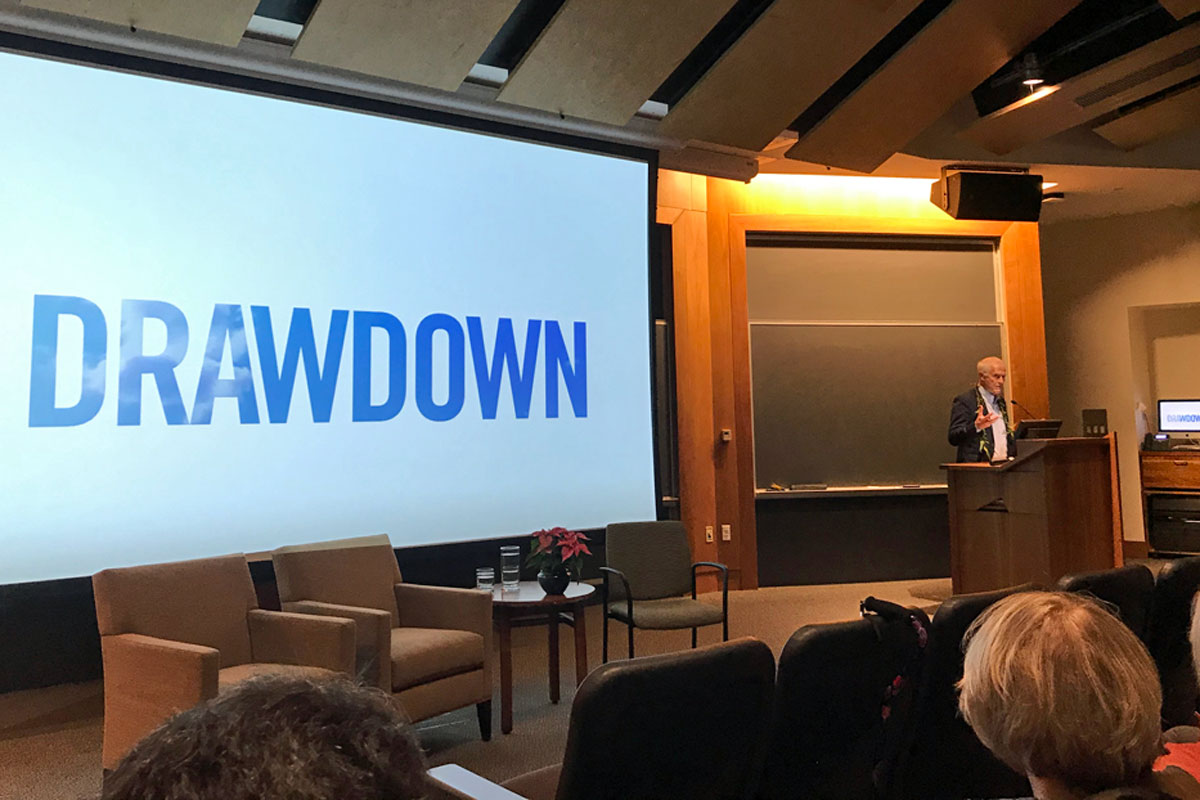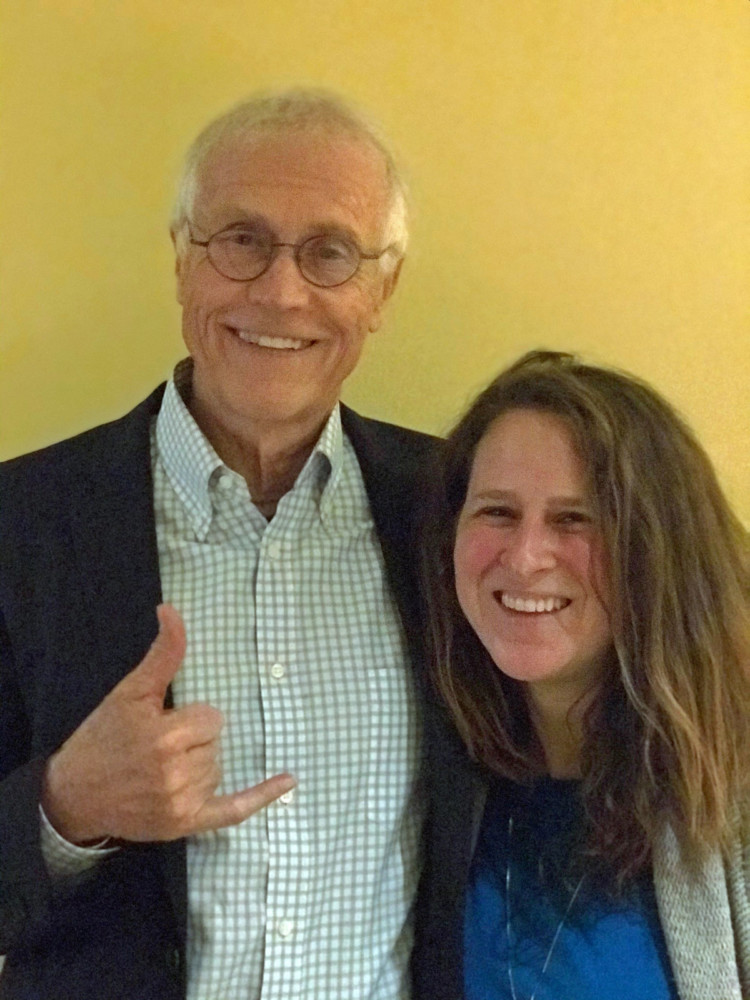
Why Drawdown’s Paul Hawken isn’t optimistic about climate – But believes in humankind’s brilliance instead.
After his recent lecture at Swarthmore College, Paul Hawken shared how the climate movement changed, CEOs coming to him in tears and a choice to be fearless. Here’s what we talked about for 45 minutes.
In the climate sphere, there’s a big debate about whether corporations or individuals can do their part to solve climate change.
And then there’s Hawken – the force who can translate how much impact each environmental action has. With a team of research fellows from across the world, his book, Drawdown, maps out the 100 most substantive solutions to climate, using only peer-reviewed research.
Although the book was released in April 2016, it is still a worthwhile read today.
After a recent lecture at Swarthmore College, Green Philly sat down for an exclusive interview with the climate legend.
Here’s the transcript, edited for clarity and length.
45 Minutes with Drawdown’s Paul Hawken

Green Philly: You came up with the idea for Drawdown in 2001. How have you noticed the climate movement evolve over the past 19 years?
Paul Hawken: It didn’t evolve that much until the last two, three years.
Prior, it was top-heavy within NGOs, IPCC, Al Gore, Jim Hanson, Bill McKibben, top-heavy men, top-heavy sports-and-war metaphors.
It was pretty distant from most people’s lives, whether they were aware and empathetic or not.
I think what’s happened is that the weather changed. It’s that simple really. It moved from a concept to experience, even if it was a vicarious experience, that my uncle’s house burned or my aunt was in Paris and it was 100 degrees.
And underneath all that, there has been a kind of breakout of people understanding soil, land, food.
What’s really new is the emphasis on food and land, from farming to food waste and what we eat. The anti-GMO movement started was very much about fear and what it did to you (i.e. if you ate it, it would affect you physiologically).
But (GMOs) are everywhere, creating the other side of the food desert, which is the cornfields or soy fields in the Midwest. In Iowa, you could get out of your car and see stalks of corn or soybeans and could wait and not hear a bird, see a butterfly, or hear an insect. There’s no life in those fields or on the margins of the fields. All of a sudden there was an understanding that soil was being turned to dirt.
Over the last three years, those things have all melded: the food movement, the food waste movement.
Then came really freaky weather events. I think there are four or five 500-year floods in Houston in five years.
It’s not a 500-year flood anymore.
The jet stream, which was always known to go whiplash, was climate disruption. So you had 95 degrees in the Arctic when it was snowing in Mexico on the same day. The weirding of weather became more prominent.
If we don’t reduce energy combustion of fossil fuel combustion by 50 percent by 2030, that we may tip over the tipping points, which is, the ice caps really melt, which then is a positive feedback loop of more heat. That idea of a systemic collapse has been raised.
That is changing the movement.
Greta Thunberg had a big effect because I feel like she really catalyzed fight for the future and the youth movement. And there are 30 young Gretas out there.
The science community was very much shackled by the consensus process of the IPCC. People talk about it as being consensus science, but there’s no such thing. Science is evidentiary. The consensus wasn’t consensus. It was politics as political science. The summary report is: IPCC was always suppressed and tamped down by countries that felt threatened by the warnings.
And things are happening that were not predicted to happen for quite a long time. The glaciers in Greenland are melting at a rate that wasn’t predicted until 2075 to 2100.
There’s a financial understanding of the Minsky moment, where whole asset classes collapse in value suddenly. Insurers are ratcheting up premiums and not writing new policies for the outer islands in North Carolina or in the fire-prone areas in California.
A lot of things are converging at the same time.
“If you’re not involved (in climate), concerned, or moving towards a solution, you’re going to be seen like somebody who tries to smoke in a plane. Where are you? What are you reading? Did you look at that sign?! I think that’s going to happen fairly quickly. It’s gonna be an overwhelm, it’s like a wave.”
– Paul Hawken
The last thing I’ve seen is anecdotal. I see CEOs; heads of significant entities, come to me, and they’re freaked out. I don’t think anybody knows it. They’re not going to go on the record because they’re in charge; they’re leaders and that’s not what a leader does. Leaders are supposed to be the ones you turn to when you’re in tears. I’ve had them come to me in tears about the future.
So something’s happened, you know?
The climate movement is in an annuity, formative state. I don’t know how it’s going to come out, but I think it’s going to be powerful.
I think it’s going to be: if you’re not involved, concerned, or moving towards a solution, you’re going to be seen like somebody who tries to smoke in a plane. Where are you? What are you reading? Did you look at that sign?! I think that’s going to happen fairly quickly. It’s gonna be overwhelming, like a wave.
Green Philly: What do you tell the CEOs who are coming to you in tears about the climate?
Paul Hawken: Each of them has a different question and they represent different modalities, in terms of selling, sharing, investing real estate.
They all have children. I think the tears come from them being fathers. Men have this innate thing about protection, In the best sense, men are protectors of family and their spouse, that’s their traditional role. That can be the best of men as a gender.
I think what’s happening is being in a sense of power and powerlessness, and that influence doesn’t do anything. Money doesn’t do anything. Position doesn’t do anything. And that’s a really startling thing because they have worked themselves up to where they are, by social intelligence, being in the right place at the right time and being fiscally literate.
All of a sudden, all the knobs don’t work, the steering wheel doesn’t work, the pedals don’t work, but the thing is doing, going, turning and you have no control.
That’s almost like a bad dream, you know, like a nightmare.
And obviously, for the ones I talked to, the information came in whether they wanted or not. They know they can’t un-know. And that’s the turmoil, the despair, the anxiety, the freaking out, the sense of powerlessness, which in many cases, I don’t think they ever had.
All of a sudden, this sense of being able to affect the world was there and now they don’t have it. And then they face the same thing that the climate movement has always faced, which is people who are numb or vastly denying, and in a patronizing way, but not actually in the least bit interested. These are the same people that he could count on for connections and money and finance or this or that or whatever.
I just see the climate movement, in slow motion, will extremely quickly be transformatively changing like the weather. My concern is people giving up.
Green Philly: Someone recently pointed out to me that, you know, when the US entered the moon mission, they created thousands of innovations that otherwise wouldn’t have been created. In Drawdown, you have 100 solutions. But there’s still a lot of people just going along with the status quo. What do you think will be a trigger that finally gets people to act on climate?
Paul Hawken: Well, which people and which action? If people could do one thing, then that’d be an answerable question.
The question itself is indicative of a subconscious thing that all of us have. The damn Berlin wall finally came down one night with sledgehammers and all, and that was over.
We don’t believe that there isn’t some way to stop this thing. I think that a part of us, not just pines for it, but almost viscerally and constitutionally, can’t imagine something that has this kind of inertia and power.
There are some just powerful realizations that have come about, in terms of positive feedback loops and how hothouse earth and the initial momentum of climate one had.
People live their lives. Imagine: Everybody is in cars, they’re stacked up for miles, not moving anywhere on big freeways, but the heat going, and some stupid radio program and people realize that their life is meaningless in some ways, at least in those moments. Yet, they don’t have a choice.
Then when you come to say “whoa, solutions!” or what you could do, it doesn’t mesh well with where they are right now. They don’t have a lot of wiggle room. That’s why I have my book (Drawdown).
Green Philly: Do you have optimism about the climate crisis?
Paul Hawken: I’m not interested in optimism and pessimism. I’m not interested in hope either. It doesn’t mean anything. It doesn’t do anything. It’s weak, “I hope.”
Hope is the mask of fear. The only reason to hope exists is because you’re afraid and what are you afraid of? That you’re going to die.
Well, you’re going to die. So that’s a guarantee. The question is, what do we do while we’re alive? If we want to go around being hopeful, that’s actually saying “I’m full of fear.”
For me, if we’re going to be here, whether it’s the next 50 years or 20 years, why not be fearless?
What are you afraid of? Okay. Loss. I can guarantee you everybody’s going to lose. Loss happens all the time.
You’re afraid you’re going to suffer. People suffer every day. Suffering is constant, every heavy human being suffers, you know?
Climate is the big one because it’s global. There’s a cause. And the cause is greed, hate, and delusion. That’s the root cause of climate change, you know?
There’s a very clear path forward. How do you create the conditions for humanity to self-organize around staying here? That’s my question. I have a question that I ask every day, every night, every time I wake up, which is human beings are smart; they’re brilliant actually.
So, what’s the problem?
If I was to say the thing that makes me feel positive about the rate of change is the weather. The weather is going to get really crappy and it wakes people up.
If you have an uncle and he’s a complete drunk and he’s oblivious to any feedback and then you find out, uncle Jack just hit a telephone pole and wiped out his Jaguar but he’s alive and he’s well and he’s in the hospital and cool. Maybe Uncle Jack figured something out because he was drunk and he was alone. And he just lost his license as well. You don’t want them hurt, but you actually want them hurt enough to wake up.
That’s what’s coming. I don’t think there’s any question about that. The question is when does it come and what will people do when it comes? I don’t know.
The answers are right there in front of us. It’s not like we have to invent something.
Stay tuned for the next part of this interview on Green Philly.









